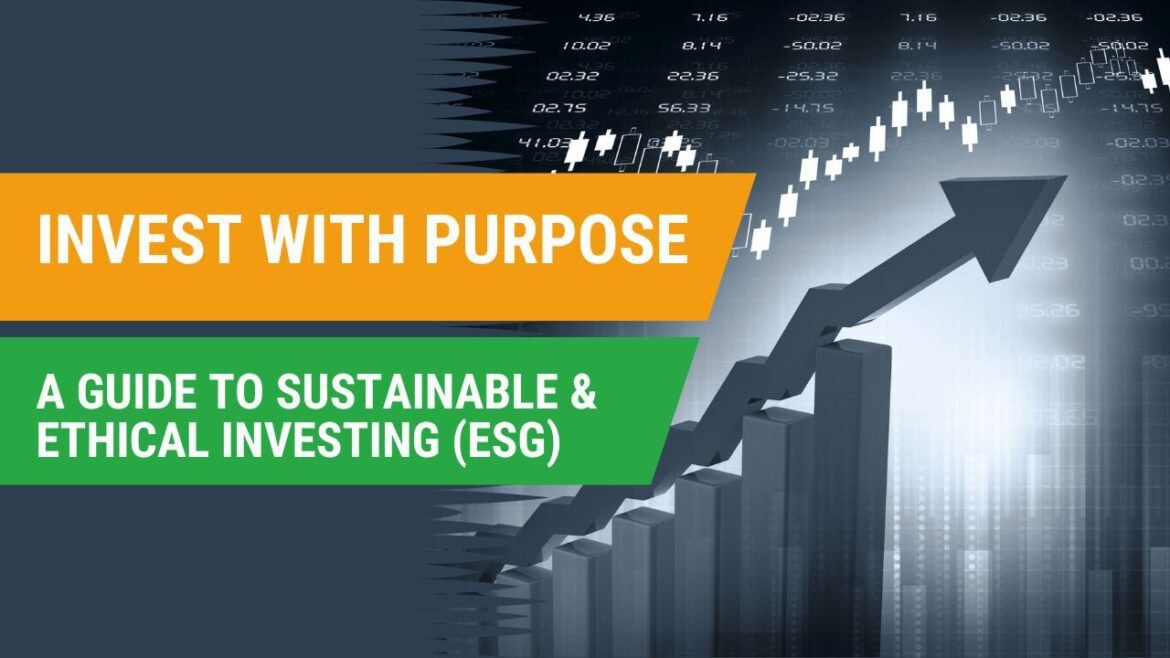In today’s interconnected world, more investors are realizing that their money can do more than just grow; it can also make a positive impact. This shift in mindset has given rise to Sustainable and Ethical Investing (ESG), an approach where financial returns are pursued alongside environmental, social, and governance considerations. For young professionals and families, ESG investing offers a powerful way to align personal values with financial goals.
Gone are the days when “ethical” investing meant sacrificing returns. Modern research and sophisticated tools show that companies with strong ESG practices often demonstrate better long-term performance, lower risk, and greater resilience. This is about investing with purpose, knowing your money is supporting companies that are building a better future.
This guide will demystify Sustainable & Ethical Investing (ESG), providing a clear roadmap for beginner investors to understand its principles, identify impactful companies, and build a portfolio that reflects their values while pursuing strong financial growth.
What is Sustainable & Ethical Investing (ESG)?
ESG stands for Environmental, Social, and Governance. It’s a framework used to evaluate how a company performs as a steward of nature, how it manages relationships with employees, suppliers, customers, and communities, and how it is led and controlled.
- Environmental (E): Focuses on a company’s impact on the natural world. This includes climate change policies, carbon emissions, pollution, waste management, water usage, and renewable energy adoption.
- Social (S): Examines a company’s relationships and reputation with people. This includes labor practices, diversity and inclusion, human rights, community engagement, customer satisfaction, and data privacy.
- Governance (G): Pertains to a company’s leadership, internal controls, audits, and shareholder rights. This includes board diversity, executive compensation, political lobbying, and anti-corruption measures.
Ethical investing and sustainable investing are often used interchangeably with ESG, though “ethical” can sometimes imply a more values-driven exclusion of certain industries (e.g., tobacco, firearms). Impact investing is a subset focused on generating specific, measurable positive social or environmental impact alongside financial return.
Why Invest with Purpose? The Benefits of ESG
Beyond the satisfaction of aligning your money with your values, ESG investing offers tangible financial benefits:
- Long-Term Performance: Studies increasingly show that companies with strong ESG practices often outperform their peers over the long term. They tend to be better managed and more resilient.
- Reduced Risk: Companies with poor ESG practices face higher risks from regulatory fines, boycotts, lawsuits, and reputational damage. ESG screening can help mitigate these risks.
- Innovation & Adaptability: ESG-focused companies are often forward-thinking, adapting to new regulations and consumer demands related to sustainability and social responsibility.
- Attracting Talent: Companies with strong ESG principles tend to attract and retain top talent, especially among younger generations who prioritize ethical workplaces.
- Meeting Investor Demand: The growing demand for ESG products is driving more innovation and capital into these areas.
How to Get Started with ESG Investing for Beginners
For beginner investors, ESG can seem complex, but there are straightforward ways to integrate it into your portfolio:
- Define Your Values: What environmental, social, or governance issues are most important to you? This will help you select the right investments.
- Choose ESG-Focused Funds: The easiest way to start is through ESG ETFs (Exchange-Traded Funds) or ESG mutual funds. These funds hold a diversified basket of companies that meet specific ESG criteria, giving you broad exposure without needing to research individual stocks.
- Look for Labels: Many funds use “ESG,” “Sustainable,” “Ethical,” or “Impact” in their names. Research their methodologies carefully.
- Look for Labels: Many funds use “ESG,” “Sustainable,” “Ethical,” or “Impact” in their names. Research their methodologies carefully.
- Utilize ESG Ratings: Independent agencies like MSCI, Sustainalytics, and Refinitiv provide ESG ratings for companies, helping you identify leaders in sustainability. Explore how MSCI rates companies on ESG.
- Screen Individual Stocks (Advanced): If you prefer individual stocks, use financial platforms that allow you to screen companies based on ESG criteria. Look for companies with transparent reporting on their sustainability efforts.
- Engage with Robo-Advisors: Many robo-advisors (automated investment platforms) now offer specific ESG portfolios tailored to your risk tolerance and values. Learn about the benefits of automated investing: Take the Leap: Your Beginner’s Guide to Smart Investing.
- Consider Shareholder Advocacy: For long-term investors, supporting shareholder proposals that promote ESG initiatives can be another way to enact change.
Key Considerations for ESG Investing
- “Greenwashing”: Be wary of companies or funds that claim to be “green” or “ethical” without substantive proof. Always look for transparent reporting and third-party verification.
- Performance vs. Values: While ESG often aligns with good performance, there might be periods where a pure ESG focus could underperform broader market indices. It’s a balance of financial goals and values.
- Data Consistency: ESG data and ratings are still evolving, and different rating agencies might have varying methodologies.
Conclusion: Your Money, Your Impact
Sustainable and Ethical Investing (ESG) is more than just a trend; it’s a powerful and growing movement that allows you to make a meaningful difference with your money. For young professionals and families, it represents an opportunity to build wealth in a way that aligns with your core values, contributing to a more sustainable and equitable future.
By focusing on companies with strong ESG practices through diversified funds or careful stock selection, you can build a portfolio that not only seeks financial returns but also fosters positive environmental, social, and governance change. Start your ESG investing journey today, and invest with purpose for a better tomorrow.
Discover more from Motive Money
Subscribe to get the latest posts sent to your email.
